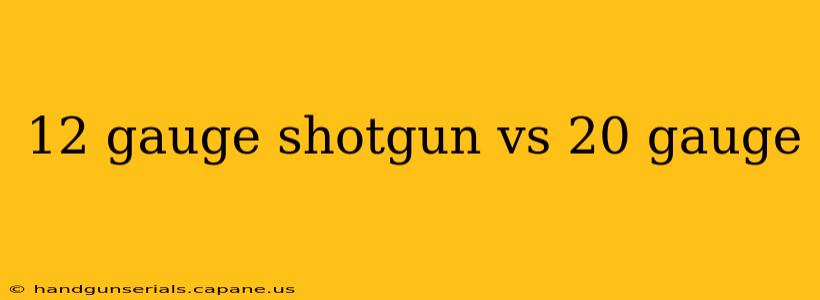Choosing between a 12-gauge and a 20-gauge shotgun is a common dilemma for both seasoned hunters and new shooters. The best choice depends heavily on your intended use, physical capabilities, and personal preferences. This in-depth comparison will help you make an informed decision.
Key Differences: Gauge, Shell Size, and Recoil
The most significant difference lies in the gauge, which refers to the diameter of the shotgun barrel. A 12-gauge shotgun has a larger bore than a 20-gauge. This translates to larger shells and, consequently, more powerful shots.
-
12 Gauge: The most popular shotgun gauge worldwide, known for its versatility and hard-hitting power. It handles a wide range of ammunition, from light target loads to heavy magnum shells.
-
20 Gauge: A lighter and more manageable gauge, perfect for smaller-statured shooters or those sensitive to recoil. While less powerful than a 12-gauge, modern ammunition offers impressive performance for various hunting applications.
Recoil: A Major Consideration
Recoil is a critical factor. The 12-gauge's larger shells generate significantly more recoil, which can be uncomfortable or even painful for some shooters, especially beginners. The 20-gauge's reduced recoil makes it more enjoyable for extended shooting sessions and easier to learn on.
Hunting Applications: Which Gauge Reigns Supreme?
Both gauges are effective for a variety of hunting scenarios, but their strengths lie in different areas:
12 Gauge: The Versatile Workhorse
- Big Game Hunting: The 12-gauge's power makes it ideal for hunting larger game, such as deer, turkey, and waterfowl at longer ranges. Heavier loads ensure clean kills and effective stopping power.
- Home Defense: Its stopping power and widespread availability of ammunition make it a popular choice for home defense.
- Clay Shooting: While heavier, the 12-gauge is perfectly suitable for various clay shooting disciplines.
20 Gauge: The Lighter, Nimbler Option
- Upland Bird Hunting: The 20-gauge's lighter recoil and reduced weight make it excellent for fast-paced upland bird hunting, allowing for quicker target acquisition and follow-up shots.
- Small Game Hunting: It's ideal for hunting rabbits, squirrels, and other small game where excessive power isn't necessary.
- Youth and Smaller Shooters: The reduced recoil makes it the perfect choice for introducing younger or smaller shooters to the sport.
Ammunition Availability and Cost
Ammunition availability is another crucial point. 12-gauge ammunition is ubiquitous and inexpensive, readily found in almost any sporting goods store. While 20-gauge ammunition is also widely available, it may be slightly more expensive and sometimes less readily stocked in smaller stores.
Which Gauge Should You Choose?
The "best" gauge depends entirely on your needs and preferences:
-
Choose a 12-gauge if: You need maximum stopping power for big game hunting, prioritize home defense capabilities, or don't mind significant recoil. Its versatility and readily available ammunition make it a top choice for many.
-
Choose a 20-gauge if: You prefer a lighter and more manageable shotgun with reduced recoil, are a smaller-statured shooter, or primarily hunt smaller game like upland birds. Its lighter weight makes it perfect for extended shooting sessions.
Ultimately, the best way to decide is to try both gauges if possible. Rentals are available at many shooting ranges, allowing you to experience the recoil and handling characteristics firsthand before making a significant investment. Consider your physical capabilities, hunting style, and budget when making your decision. Don't hesitate to consult with experienced shooters or professionals at your local gun store for personalized advice.

